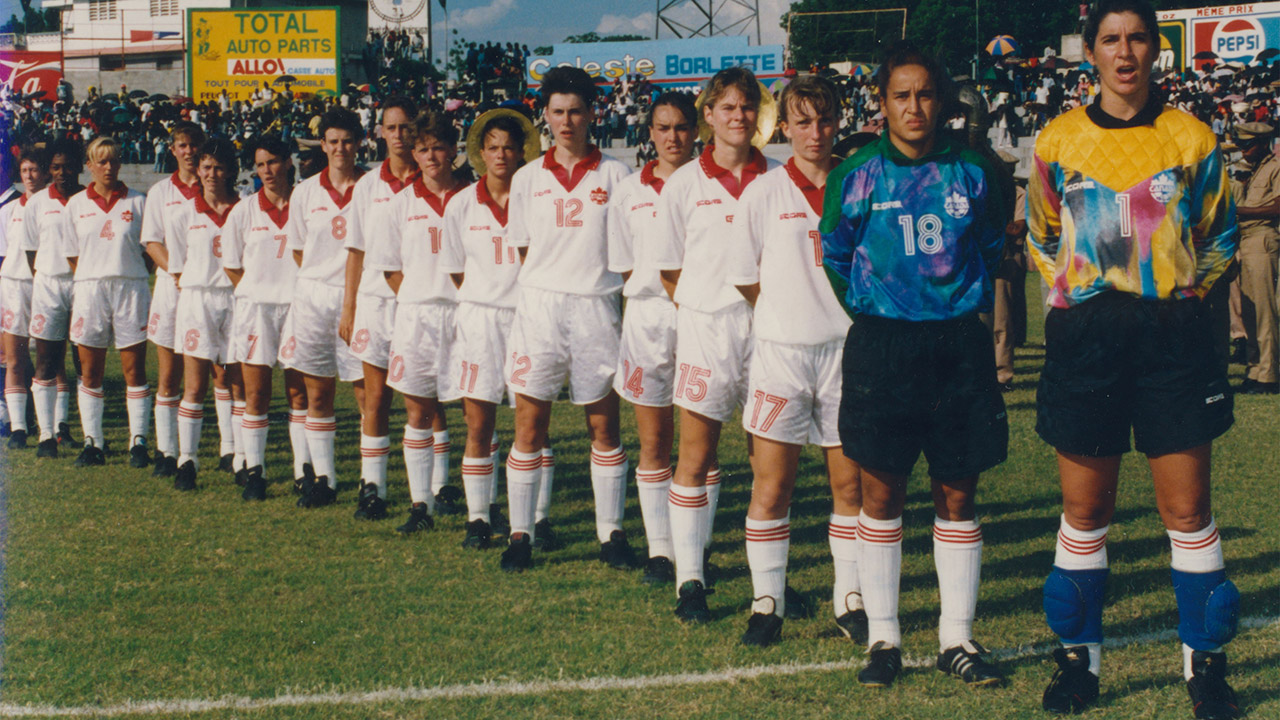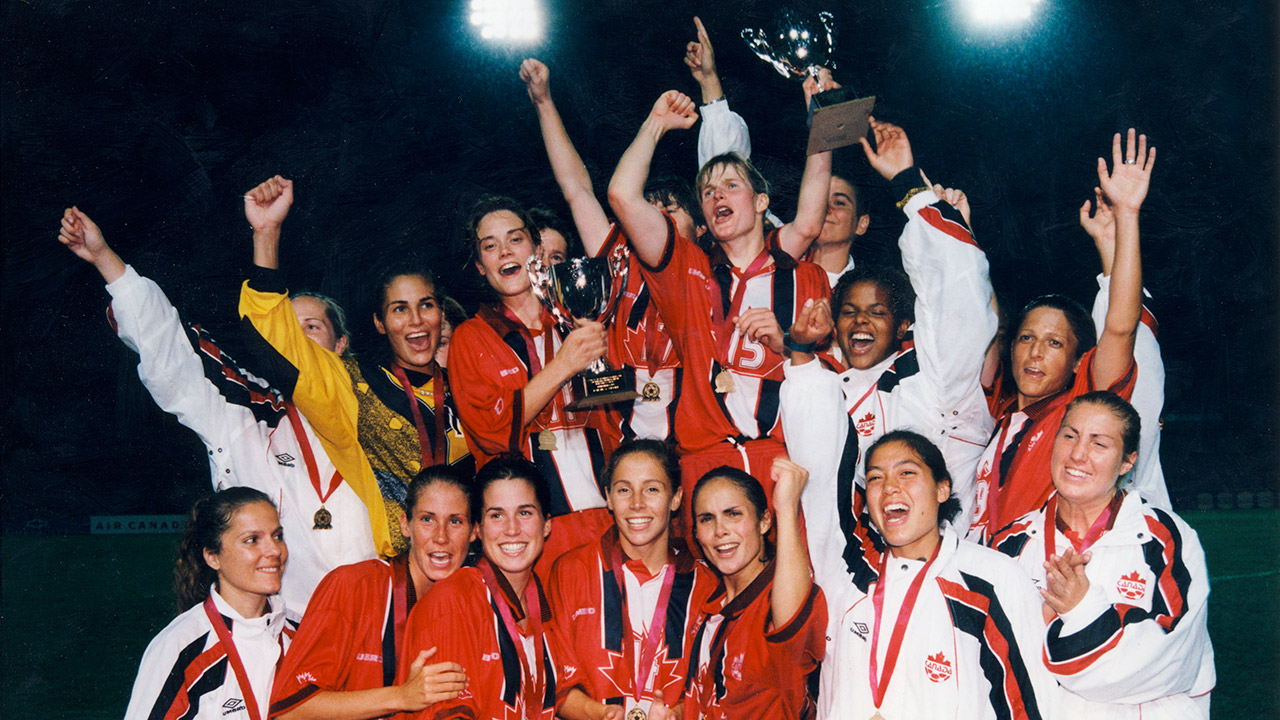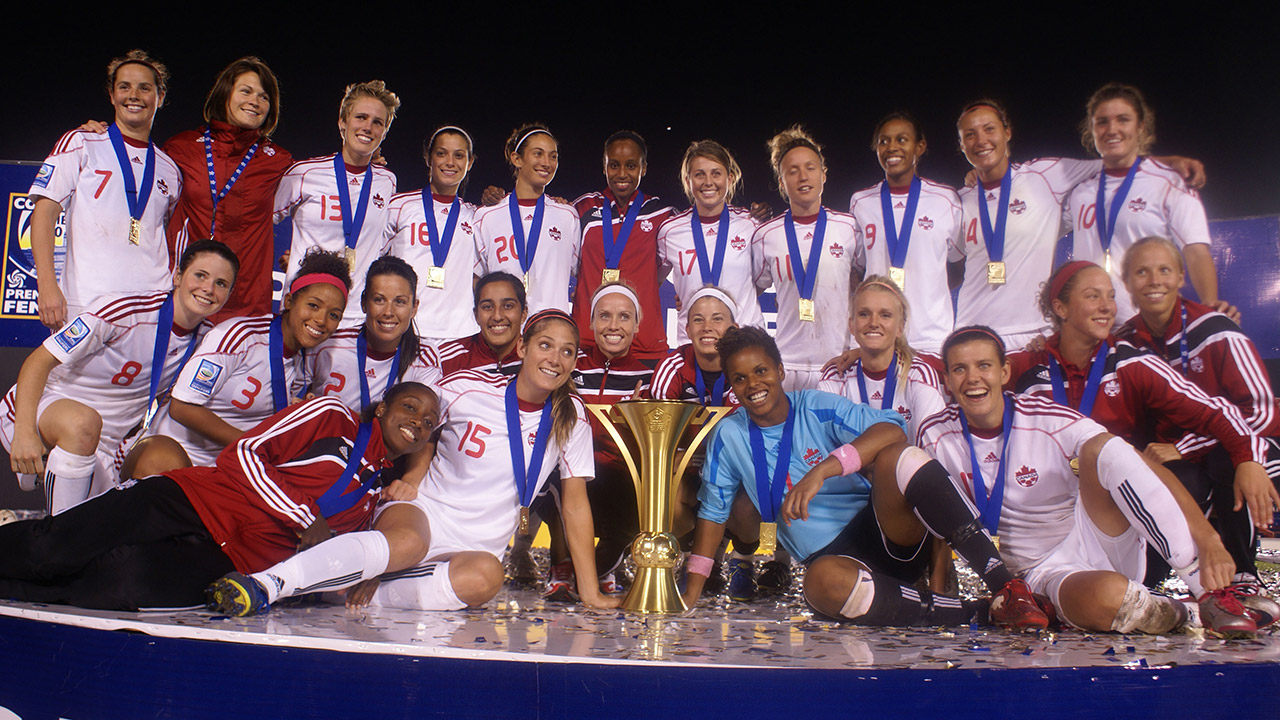Since its inception in 1991, the Concacaf Women’s Championship has proven to be a couple of things: consistently inconsistent and a career springboard for many Canadian players.
Just how is it consistently inconsistent? Over the span of 27 years, the tournament has sometimes been used as qualifiers for the FIFA Women’s World Cup. Other times it hasn’t. It’s also been an invitational tournament, while on a few occasions it was known as the Concacaf Women’s Gold Cup. To make things even more confusing, it also didn’t follow the quadrennial cycle of a World Cup or Olympics until 2002.
But regardless of the format or location, the competition opened the door to one of the best rivalries in all of women’s sport, while helping a long line of Canadians make their mark on the international stage.
Here’s a closer look at how Canada has fared at the various editions of the Concacaf tournament over the years:
Year: 1991 hosted by Haiti
Winner: USA
Canada’s finish: 2nd
Notes: Games were only 80 minutes long. A whopping 101 goals were scored through 16 matches, a rate of over six per game.
The U.S. defeated Canada 5-0 in the final, and the Americans advanced to the 1991 FIFA Women’s World Cup in China. The loss nullified Canada’s chance at attending a World Cup for the first time because there was only one Concacaf berth available.
Charmaine Hooper was Canada’s top goal-scorer, finding the back of the net seven times. Three Canadians finished with four goals: Annie Caron, Fabienne Gareau and Lydia Vamos.
There was just one teenager on Canada’s roster, 18-year-old midfielder Suzanne Gerrior. In comparison, the 2018 group has four.

Year: 1993 hosted by USA
Winner: USA
Canada’s finish: 3rd
Notes: Because this edition of the tournament was not a World Cup qualifier, only four teams took part. Just six matches were played, and New Zealand (normally an Oceania Confederation team) was a special guest, hence the tournament being called the Concacaf Women’s Invitational Championship.
Canada finished with a 1-1-1 record. Lydia Vamos led the way in scoring, notching two goals. Sylvie Béliveau coached the group — the first time a woman was behind the bench for the Canadian senior squad.
Year: 1994 hosted by Canada (in Montreal)
Winner: USA
Canada’s finish: 2nd
Notes: The Americans won the tournament for the third time.
Canada’s second place finish was historic, as it qualified them for the FIFA Women’s World Cup for the first time.
Sylvie Béliveau continued her role as coach, leading the way with a veteran-laden roster of 18 that featured no one under the age of 20. In Canada’s 6-0 win over Mexico, Silvana Burtini scored five times. She had eight goals over the span of the tournament.
And look no further to how much the game has grown in our country when seeing the attendance in Montreal. The closing match had 2,610 on hand at Complexe sportif Claude-Robillard. Fast forward a little over 20 years later: over 53,000 people packed Edmonton’s Commonwealth Stadium to be on hand for Canada’s opening match of the 2015 FIFA Women’s World Cup.
Year: 1998 hosted by Canada (southern Ontario)
Winner: Canada
Notes: Because the 1999 Women’s World Cup was hosted by U.S., they earned an automatic berth and did not participate in the Concacaf competition.
The 1998 edition was Canada’s best finish to that date. Silvana Burtini (now a Canadian Soccer Hall of Famer) continued to leave her signature on the tournament, scoring eight times, winning the Golden Boot. The team featured the sister duo of Amy and Cindy Walsh. It also marked the major competition debut of 18-year-old goalkeeper Karina LeBlanc, who would go on to represent Canada at four more Concacaf Championships.

Year: 2000 hosted by USA
Winner: USA
Canada’s finish: 4th
Notes: This was a Gold Cup edition with special invites to Brazil and China.
At just 17 years old, Christine Sinclair took part in her first senior Concacaf tournament, one of Canada’s youngest debutantes at that time. She scored five times over the course of five matches. However, it was 32-year-old Charmaine Hooper (also now a Canadian Soccer Hall of Fame member) who led the Canadians in scoring with seven goals.
Year: 2002 hosted by USA and Canada (Victoria)
Winner: USA
Canada’s finish: 2nd
Notes: This was the first edition of the tournament, also a Gold Cup, that saw a dual-host. Canada’s first two matches were played at Victoria’s UVic Centennial Stadium. The semifinal versus Mexico was at Safeco Field in Seattle while California’s Rose Bowl stadium hosted the final.
The 2002 roster included a group of players who together would go on to represent Canada hundreds of times — literally. Mel Booth, Candace Chapman, Karina LeBlanc, Erin McLeod, Carmelina Moscato, Christine Sinclair and Brittany Timko would all win Olympic bronze in 2012. Together, LeBlanc and McLeod would form Canada’s decade-long goalkeeping tandem.
In five matches, Sinclair scored seven times. The final versus the U.S. was a tremendous battle, which was knotted at 1-1 until Mia Hamm beat LeBlanc in the fourth minute of extra time. The gold medal final was a sign of things to come for the Canada-U.S. rivalry.
Year: 2006 hosted by USA
Winner: USA
Canada’s finish: 2nd
Notes: The final Gold Cup. The competition featured six teams in a single-elimination format. The top two teams booked tickets to the 2007 World Cup in China. The third-place finisher would go to a playoff versus a team from the Asian Federation.
Enter another group of Canadian players who would go on to have formidable international careers: Robyn Gayle, Diana Matheson, Sophie Schmidt, Melissa Tancredi and Rhian Wilkinson.
And yet another Canada-U.S. battle culminated on the final day with a heartbreaking extra-time loss for the Reds at the hands of Kristine Lilly on a penalty in the 120th minute.

Year: 2010 hosted by Mexico
Winner: Canada
Notes: American Abby Wambach led the tournament in scoring with eight goals.
A hiccup by the Americans is just what Canada needed in 2010. The Canadians completely avoided playing their foes because the U.S. surprisingly lost the semifinal to Mexico — the Americans’ first ever defeat at the tournament.
Captain Christine Sinclair would sink a penalty in the 53rd minute of the championship game to secure the Canadians their second Concacaf title. She also led the team in scoring with six goals. Canada’s goalkeepers and back line were stellar, not conceding a single goal.
This marked Carolina Morace’s first and only Concacaf tournament. It’s ironic how Canada won this competition and the following year, would see their worst showing at the Women’s World Cup. It essentially ended Morace’s tenure and ushered John Herdman into the fold. It was a fascinating series of events that had a profound impact on what we see today in the Canadian women’s program and essentially Canadian soccer as a whole, given Herdman’s influence.
Year: 2014 hosted by USA
Winner: USA
Notes: As hosts of the 2015 World Cup, Canada earned an automatic berth and did not take part in the Concacaf tournament.
Year: 2018 hosted by USA
Winner: TBD
Canada’s finish: TBD
Notes: Eight teams are taking part in this October’s competition, including debutant Cuba. Matches will be played across three venues in U.S.. The top three teams advance to the 2019 Women’s World Cup in France. The fourth-place team qualifies for a playoff versus Argentina, with the winner booking a World Cup spot.
[relatedlinks]

